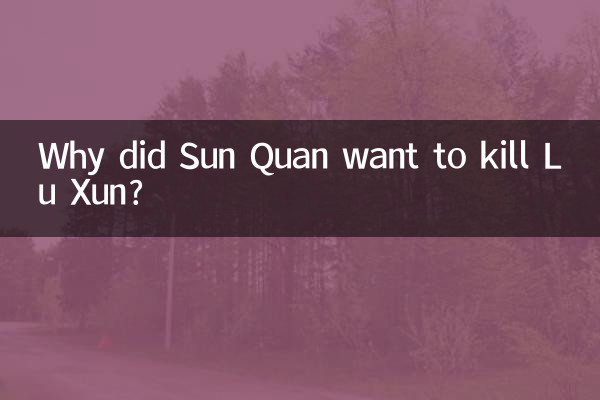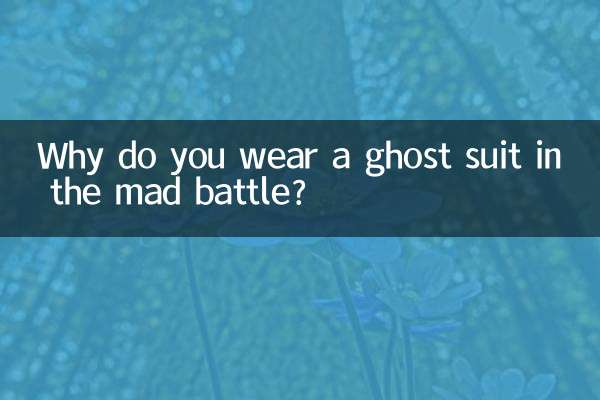Why did Sun Quan kill Lu Xun: Analysis of historical mysteries and power struggles
In the history of China's Three Kingdoms period, the relationship between Sun Quan and Lu Xun has always been a controversial topic. As an important general of Soochow, Lu Xun had made great military exploits, especially his defeat of Liu Bei in the Battle of Yiling, which made indelible contributions to the stability of Soochow. However, in his later years, Lu Xun was jealous of Sun Quan because of his involvement in the fight between Prince Sun He and King Sun Ba of Lu, and eventually died of grief and anger. So, why did Sun Quan kill Lu Xun? This article will analyze it from three aspects: historical background, power struggle and personal factors, and combine it with hot topics in the past 10 days to explore the modern enlightenment of this historical event.
1. Historical background and Lu Xun’s achievements

Lu Xun was an important general in Soochow. He followed Sun Quan in his early years and gradually rose to prominence. In the Battle of Yiling, he defeated Liu Bei's army with a small number and won a key victory for Soochow. After that, Lu Xun guarded Jingzhou for a long time and became one of the pillars of Soochow. However, as Sun Quan's desire to control power strengthened in his later years, Lu Xun's reputation and influence gradually became Sun Quan's hidden worry.
| event | time | influence |
|---|---|---|
| Battle of Yiling | 222 years | Lu Xun defeated Liu Bei and established the security of western Soochow. |
| Battle of Shiting | 228 years | Lu Xun defeated Cao Xiu and consolidated the northern defense line of Soochow |
| Involved in the Second House Controversy | 245 years | Lu Xun supported the crown prince Sun He, which aroused Sun Quan's suspicion. |
2. Power struggle: the trigger of the dispute between the second house
In Sun Quan's later years, the famous "Second Palace Struggle" broke out in the Soochow court, that is, the power struggle between Prince Sun He and King Sun Ba of Lu. As an important minister in the court, Lu Xun supported the prince Sun He, while Sun Quan had doubts about the prince's party. This struggle not only involved the distribution of power inside and outside the palace, but also reflected Sun Quan's concerns about what happened after his death. Lu Xun's intervention made Sun Quan think that he might threaten the rule of the Sun family, which ultimately led to the suppression of Lu Xun.
3. Personal factors: Sun Quan’s suspicion and Lu Xun’s tragedy
Sun Quan had a suspicious character in his later years, and was especially wary of generals who had great achievements and shocked the lord. Lu Xun's reputation and influence made Sun Quan feel uneasy, especially in the dispute between the two palaces. Lu Xun's position was not completely consistent with Sun Quan's. Although Lu Xun did not commit any obvious acts of rebellion, his very existence was seen as a potential threat. In the end, Sun Quan deprived Lu Xun of his military power and official positions, which indirectly led to Lu Xun's death in anger.
| factors | Specific performance | result |
|---|---|---|
| The master of great achievements | Lu Xun had outstanding military exploits and a high reputation | Aroused Sun Quan's suspicion |
| Involved in palace struggle | Support Prince Sunhe | Considered a threat by Sun Quan |
| Suspicious in old age | Sun Quan's vigilance towards powerful ministers | Lu Xun was deprived of power |
4. Modern Enlightenment: The Balance of Power and Trust
The historical incident of Sun Quan killing Lu Xun is not only an ancient case of power struggle, but also has certain implications for modern society. In modern business management or political life, how leaders balance power and trust and how to avoid losing talents due to suspicion is a question worth pondering. Among the hot topics in the past 10 days, discussions on "leadership" and "team trust" have also appeared many times, indicating the practical significance of this issue.
To sum up, there are many reasons why Sun Quan killed Lu Xun, including the influence of historical background, power struggle and personal suspicion. This incident reminds us that excessive concentration of power and lack of trust often lead to tragedies. In modern society, how to avoid similar history from repeating itself is a topic we need to continue to think about.

check the details

check the details